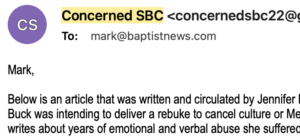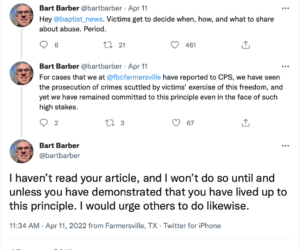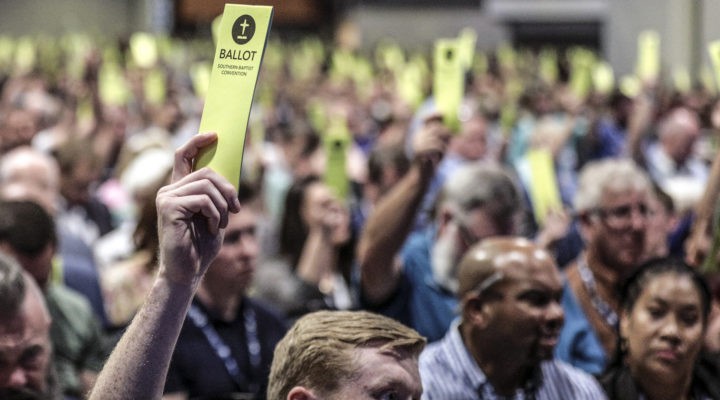We have written three drafts of a news story you’re not going to see published. Instead, I’m going to use this analysis column to explain how exceedingly complicated it is to address the challenges of sexual abuse and politics in the Southern Baptist Convention and what that has to do with the denomination’s upcoming presidential election.
Along the way, we’re going to consider what happens when mean people do the right thing, when kind people do the wrong thing and when conflict-averse people don’t do anything except spread fear. And for good measure, we’ll throw in a dose of shoot-the-messenger syndrome.
This is a cautionary tale on every level. It is a tale in which nobody comes off looking saintly. And it is probably true to life.
“This is a cautionary tale on every level. It is a tale in which nobody comes off looking saintly.”
Most of what I’m going to explain here is a matter of public record, and I will link to sources as appropriate. But some of what I’m going to explain here has been verified by multiple (three or more) knowledgeable sources who cannot be named for fear of reprisal.
The abuse case
This is a story that begins with a tragic case of sexual abuse 17 years ago at J.W. Mitchell High School in New Port Richie, Fla. There, a language arts teacher and assistant football coach named Jeff Ford had a sexual relationship with an 18-year-old high school senior. The testimony of the girl’s mother and the confession of the former teacher are matters of public record.
There is nothing redemptive about this part of the story. Even though the victim was not a minor, Ford abused his authority as a teacher. He forfeited his teaching license and agreed never to work with children again. However, Ford subsequently had a profound religious conversion experience and has testified that he has lived a new life ever since.
What has only recently come to light is that Ford’s pastor at the time was Tom Buck, who then was pastor of Riverside Fellowship Church in New Port Richie, which is located about 20 miles north of Clearwater. Today, Buck serves as pastor of First Baptist Church of Lindale, Texas, and is an outspoken internal critic of the SBC, which he believes is sliding into liberalism.
“What has only recently come to light is that Ford’s pastor at the time was Tom Buck.”
The controversial pastor
Based on his public persona, Buck does not present a likeable character. He appears angry, is known for mean tweets and espouses the narrowest of Calvinistic theologies. He’s the pastor who at the time of her inauguration as America’s first Black vice president called Kamala Harris a “Jezebel.” He also said Christians should not celebrate Judge Ketanji Brown Jackson’s confirmation as the first Black female justice of the Supreme Court because he disagrees with her views on abortion.
Buck has spoken forcefully against sexual abuse but also has claimed that “effeminate men” are the “biggest problem right now in the SBC.”

Tom Buck
Here’s where it gets complicated.
By the accounts of some knowledgeable people I trust, it appears that Buck may have done the right thing in a very difficult situation that he knew would be called into question because of his angry persona.
Back years ago, Tom Buck and Jeff Ford were friends; they also have kept up with each other from time to time through the years. It was Tom Buck took Jeff Ford to authorities to confess his sexual abuse of a student. But some time later, it also was Tom Buck who wrote a glowing letter of recommendation for Jeff and Liza Ford to become adoptive parents.
What has transpired between them in the intervening years is not clear.
What is clear is this: Tom Buck wants to see his friend Tom Ascol elected president of the SBC. They share a theological and political perspective. So, when Willy Rice announced his willingness to run as an institutional loyalist candidate, Buck apparently started researching him and his church. At least that’s the way the story has been conveyed to me. Buck disputes the claim that he was doing “opposition research.”
By this version of events, Buck discovered his old friend Jeff Ford now was a deacon and lay leader at Rice’s church, and that caused him alarm. Yet Buck knew if he were the one to raise the alarm, it would look like he was politically motivated. Nevertheless, he contacted Rice in hopes that Rice would see the error of his ways and quietly withdraw from the presidential race, to avoid potential embarrassment to everyone in a year when the SBC will receive the report into an investigation of mishandling sexual abuse claims.
Buck himself portrays a nuance here by saying he called to alert Rice to the potential problem, not to force him to stand down in the presidential race. Others who know both men see the situation as a threat, whether explicitly stated or not.
The presidential candidate
Instead, Rice delayed, first issuing a video explaining the accusations that had been made and acknowledging he and church leaders could have done better, then following up with a Sunday sermon in which he defended Ford and called for recognition that people can change through the grace of God.
Behind the scenes, all this was infuriating to SBC leadership who realized Rice’s presidential aspirations needed to be over — a concession Rice was not yet willing to make.
“Behind the scenes, all this was infuriating to SBC leadership who realized Rice’s presidential aspirations needed to be over.”
This is where the odd alliance begins between Buck and some other Southern Baptists who don’t care for his politics or style but toe a hard line against people accused of previous abuse. These abuse survivors and survivor advocates agreed with Buck that Rice and his congregation had made a grievous error in ordaining Ford as a deacon and allowing him other leadership roles in the church. And they were stunned that neither Rice nor anyone else in his congregation’s leadership appeared to have a problem with this.

Willy Rice
Herein lies one of the most difficult aspects of talking about sexual abuse and the church. Some people want to take a hard line against any leadership role for any person known to have been abusive at any time in the past, regardless of circumstances. This sentiment is explicitly stated in the SBC’s own 2021 resolution on sexual abuse, which says that “any person who has committed sexual abuse is permanently disqualified from holding the office of pastor and that we recommend all affiliated churches apply this standard to all positions of church leadership.”
Yet in the real-life, relational nature of church life, things may appear more nuanced. When a congregation knows a person not by their past mistakes but by how they present themselves today, those hardline blanket denouncements may seem negotiable.
Add the growing awareness of and conversation about sexual abuse in the church, and it’s easy to understand how a pastor or a church might have made a decision five or 10 years ago that they might not make today. That’s one of the points Rice made in his video. And his words no doubt echoed with many pastors who could find themselves in the same situation of being judged by past decisions.
“His words no doubt echoed with many pastors who could find themselves in the same situation of being judged by past decisions.”
On the one hand, we see outsiders declaring, “You should have known better!” While on the other, we see church leaders responding, “You don’t know our church or our people or what we’ve experienced in life together.”
A perceived political attack
Thus, even if Buck’s motives in calling Rice were pure, his inquiry was not received that way. It felt like a political attack on an autonomous Baptist congregation and a pastor running for denominational office.
See the unlikely confluence of events here — one of the most outspoken critics of SBC leadership just happened to be the former pastor of a questionable deacon ordained in the church of a presidential candidate favored by institutional loyalists. You can’t make up a story like this.
For context, remember a heated battle is raging within the SBC over its leadership and future. Last year’s presidential race — which came down to candidates favored by the same two groups — was decided on about a 500-vote margin.
The vision articulated by Tom Ascol and the SBC Calvinists and the vision articulated by Willy Rice or Bart Barber and the institutional leadership are miles apart. The best comparison I can make is to cite the difference between Sen. Mitt Romney and Rep. Marjorie Taylor Greene. Both are Republicans, but they employ vastly different tactics and see even the conservative world differently.
So, forcing Rice out of the presidential race could understandably be seen as politically motivated, even if it wasn’t. The net effect is the same, even though some denominational insiders believe Barber, the new institutional candidate, is a more viable option than Rice was.
“Forcing Rice out of the presidential race could understandably be seen as politically motivated, even if it wasn’t.”
Buck’s perceived threat against Rice was so upsetting to some of Rice’s supporters that some of them reportedly demanded Buck stand down and maybe even threatened him. Most of that happened behind the scenes, although both Tom Buck and his wife, Jennifer, have alluded to it in tweets.
An anonymous tipster
Out of this pushback, a person still unknown to me created an untraceable email address and on March 27, just a few days prior to Rice’s video statement, sent me (and apparently other media outlets) an incendiary tip about Tom Buck.
 The tip claimed Jennifer Buck wrote an article that described her husband as emotionally and verbally abusive toward her in the first five years of their marriage. The anonymous tipster sent a copy of an original draft of the article, which reportedly was intended for an online blog in 2018 but never was published. Jennifer Buck confirmed in an April 18 tweet that she had indeed written the draft and that her husband had seen it.
The tip claimed Jennifer Buck wrote an article that described her husband as emotionally and verbally abusive toward her in the first five years of their marriage. The anonymous tipster sent a copy of an original draft of the article, which reportedly was intended for an online blog in 2018 but never was published. Jennifer Buck confirmed in an April 18 tweet that she had indeed written the draft and that her husband had seen it.
(The Jennifer Buck in this story is not the Jennifer Buck currently in the news as author of the controversial book Bad and Boujee: Toward a Trap Feminist Theology.)
BNG did not report on this information initially, because the source could not be verified. However, after the Calvinist group G3 — which Tom Buck serves as an active board member — published an edited version of Jennifer Buck’s article April 7, we did release a story about the chain of events and the public contents of her statements on Monday, April 11.
We deemed this story newsworthy for several reasons, including its relevance to the ongoing drama about SBC presidential candidates. But perhaps more importantly, we wanted to portray the theology that drove Jennifer Buck’s writing in the first place. In her own words, she said her intent was to encourage other wives to stick with their husbands even in the midst of possible abuse because doing so will bring glory to God, who is able to redeem flawed marriages.
“She said her intent was to encourage other wives to stick with their husbands even in the midst of possible abuse because doing so will bring glory to God, who is able to redeem flawed marriages.”
This in itself is a controversial perspective often associated with the kind of complementarian theology found widely in the SBC today. The theology behind this viewpoint would require a separate article to address.
Shoot the messenger, part 1
One irony here is that others — including some who are not fans of Tom Buck — immediately jumped to Jennifer Buck’s defense. They called her an abuse “victim,” a label she had not used herself.
BNG received an onslaught of tweets, emails and phone calls denouncing us for taking away an abuse victim’s agency, as though we had reported things she had not already said publicly — which we had not. See my opinion piece from last week for a fuller explanation of this.
 Chief among our critics was Bart Barber, pastor of First Baptist Church of Farmersville, Texas, who had entered the SBC presidential race one day after Rice withdrew his name from consideration because of the furor over the deacon ordination situation.
Chief among our critics was Bart Barber, pastor of First Baptist Church of Farmersville, Texas, who had entered the SBC presidential race one day after Rice withdrew his name from consideration because of the furor over the deacon ordination situation.
On April 11, Barber tweeted at us: “Victims get to decide when, how, and what to share about abuse. Period.” Then Barber admitted he had not read the BNG article he was criticizing and had no intention of reading it.
Another anonymous account
The plot thickened April 12. A Twitter user going by the pseudonym “Walt Lisly” replied to a thread discussing my defense of our news report in which I said BNG would not take down the article just because some critics didn’t like it or didn’t think we should be talking about it.
Walt Lisly tweeted: “Imagine being the deacon who already paid his penance almost 17 yrs ago. Imagine him getting a call from Buck on a Friday night saying this was going to be released for no other reason than Rice was a nominee & Buck didn’t want him to be. Buck was FRIENDS with the deacon.”
 Barber replied with a direct criticism of BNG’s Clemons Fellow, David Bumgardner, who wrote the April 11 article: “What a tragic irony that @david_bumg was the one who, while things were already far too hot in the convention, decided it was time to kindle a fire and pour gasoline on it.”
Barber replied with a direct criticism of BNG’s Clemons Fellow, David Bumgardner, who wrote the April 11 article: “What a tragic irony that @david_bumg was the one who, while things were already far too hot in the convention, decided it was time to kindle a fire and pour gasoline on it.”
But to this, Tom Buck replied: “The person who leaked my wife’s rough draft is the real culprit, and the people who disseminated it all over the SBC are equally responsible. There is a reckoning coming.”
To Buck’s threat of a reckoning, Walt Lisly replied with a lengthy and fiery thread:
“Gosh, the person who leaked this sounds just like Tom Buck and the way just a little over a week ago you called and threatened your friend the deacon (who did nothing wrong besides publicly sinning 17 years ago and having you as a supposed friend). Remember when you were collaborating with a blogger giving them 17 yr old newspaper articles about your friend the deacon since Rice hadn’t released a statement quick enough? All in the name of SBC politics and to dethrone Rice. Remember how the deacon repented, found Christ and was living a good life with his family? Remember when you had the deacon and his wife stay with you and your young children? You felt safe having him stay with you then. Remember how you victimized his family by putting them through this trauma again? Remember how his wife experienced extreme trauma 17 yrs ago and you encouraged her to give the deacon a chance? It’s easy to forget all the things you’ve done isn’t it? Everyone can disregard me though. I’m just a troll who obviously knows nothing about Buck.”
What we now know — confirmed by at least five knowledgeable sources — is that Walt Lisly is Liza Ford, wife of the accused deacon in Willy Rice’s church. This makes sense, because who else would have the kind of insider information referenced in the series of tweets against Buck?
Shoot the messenger, part 2
As these revelations about the relationship between the Bucks and the Fords came to light over the past week, we’ve been cautiously monitoring developments. We weren’t going to write another story until all the facts were clearly documented.
That turning point came on Monday, April 18, when we were able to verify the chain of events. And then we started getting pressure not to publish what we knew — even though most of what we were going to report was publicly known through Twitter.
The reasoning went something like this: If you report on this again, you’re only going to inflame an already difficult situation. You’re going to imperil the important work of the SBC Sexual Abuse Task Force. You’re going to empower Tom Buck to claim he’s a victim of intimation by SBC insiders. You’re going to give voice to people who don’t need more of a platform. You’re going to do more harm than good.
“Because I’ve been covering the SBC almost 40 years, I’ve heard all this before.”
Because I’ve been covering the SBC almost 40 years, I’ve heard all this before. And some of these appeals made me think back to an earlier time in the first battle for the heart of the SBC.
In the early 1990s, as the so-called “conservative resurgence” in the SBC raged on, Houston megachurch pastor and SBC President Ed Young chided the denominational press for seeking information about a fundamentalist leader who had done something untoward. I can’t remember who had committed the sin or what it was, and that doesn’t really matter.
What matters is Young’s expectation of the press. He said this: “As a man who seeks to understand and live by the Bible, I should not in any way seek to uncover anything about your life and publicize it in a negative way, whatever you have done, whatever I have done. We are to cover our brother’s nakedness.”
What he meant was this: Don’t report on this unfortunate event because it will reflect poorly on our dear brother. And he referenced the odd story about naked Noah from Genesis 9 as scriptural justification. Because everything needs a biblical prooftext.
You can see the hypocrisy. One of the powerful men who had gained control of the denomination by purportedly “exposing” hidden liberalism now wanted to keep the truth under cover.
That’s the same danger today when those who claim to support abuse survivors don’t want us to report on relevant news out of fear that most people — in the immortal words of Jack Nicholson in A Few Good Men — can’t handle the truth.
Epilogue, part 1
After days of virtual silence during Holy Week, on the afternoon of Monday, April 18, Jennifer Buck released a statement via Twitter explaining her position: “Those who have attempted to destroy and silence my husband have willfully endeavored to tamper with a marriage. They have shown themselves to have little regard for the union between husband and wife — the union that God created and holds in high value.
“Many men, in these circumstances, would respond in anger and blame his wife, as if she should have known such twisting of her words were possible. For some, this would have had great potential to put their marriage in jeopardy. Tom is not that man. Those who think they know him are ignorant of who he really is.
“Tom is not that man. Those who think they know him are ignorant of who he really is.”
“Not once has he looked at me as contributing to the ungodly actions of others. Not once has he even second guessed us working together on the original rough draft, because the final product was to reflect the glorious restorative grace found in our Lord Jesus Christ as an encouragement for others. Therefore, when people twisted my words and assigned false motives, he has been resolved to deal with the real issues and not react to the distortions.”
Meanwhile, those close to the Fords report that the renewed attention to the 17-years-ago incident has traumatized them and their family. Liza Ford declined to speak with BNG, but several people who are close to her did speak on background rules to confirm that she is angry that a former pastor, someone she thought of as a friend, has thrown her family into the public spotlight for what she considers political gain.
And then, on the afternoon of Tuesday, April 19, the elders of Tom Buck’s church issued a lengthy statement defending their pastor and his wife and accusing BNG of attempting “to redirect attention away from (Jennifer Buck’s) theme of redemption, instead seeking to discredit Tom and his ministry.”
Who the elders are or how many elders the church has was not stated and is not shown on the church’s website.
The statement also takes aim at other SBC leaders, including Willy Rice, Southeastern Baptist Theological Seminary President Danny Akin and SEBTS professor Karen Swallow Prior, whom the elders say was “the only person with whom Jennifer shared the rough draft” of her initial article. Prior has not publicly commented on this assertion, and my observation is that this respected seminary professor doesn’t fit the profile of an anonymous leaker.
While lambasting SBC entity heads and others, including people associated with the SBC Ethics and Religious Liberty Commission, for allegedly circulating among themselves the rough draft for several years, the statement says all this is part of an intentional effort to discredit their pastor.
“These actions go well beyond gossip,” the elders wrote. “They indicate an intentional desire to discredit our pastor and harm his wife, all the while harming and distracting the church they serve from her mission. Yet more tragically, the messaging of the accusers has served to undermine the gospel hope that Jennifer’s article communicates. This wicked behavior involves an ever-increasing number of people in the SBC.”
Epilogue, part 2
Late afternoon on April 20, Tom Buck also released a statement on Twitter labeled “An important update on ongoing misreporting,” seeking to discredit this very story that had gone live the same morning. In that statement, he portrayed himself and his wife as the only true victims in what he called the “Willy Rice situation.”
“Despite being the sole instigator of this chain of events, Buck wrote: ‘I didn’t want this situation to become public, and I am deeply saddened that Jeff and his family have been hurt in all of this.'”
Buck said he “never threatened Jeff, Willy or to harm Calvary Baptist Church. I never suggested Willy withdraw from the SBC presidential race.” In Buck’s telling, he explained to Rice that “I loved Jeff and his wife and did not want to do anything to harm them and that I was simply bringing the information to Willy so his church could handle it in a biblical way.”
Despite being the sole instigator of this chain of events, Buck wrote: “I didn’t want this situation to become public, and I am deeply saddened that Jeff and his family have been hurt in all of this.”
That this blew up is not his fault, Buck added, but the fault of Rice. “Sadly, it was the actions of Willy Rice that exposed Jeff and his family when Willy announced the situation on April 1 in a video to his church posted on Twitter. Willy did not do this under any threat from me or anyone else I know.”
Further, Buck added: “The only person who has been threatened is my wife and me. The only people doing opposition research were those who had been spreading my wife’s draft and sent it to the SBC leaders who were advising Willy Rice to stay in the SBC presidential race, even though I hadn’t even suggested to Willy that he drop out.”
Despite the recent history of heated dialogue on all these matters via Twitter, Buck’s latest post was set so that no one is allowed to reply publicly to him. Meanwhile, Rice has posted only one Easter message to Twitter and nothing else since April 6, the day he announced his withdrawal from the presidential race.
Related articles:
No, we will not take down an article you don’t like | Opinion by Mark Wingfield
SBC presidential candidate Willy Rice removes deacon over past ‘abusive’ behavior
Willy Rice no longer a candidate for SBC presidency
A surprising nominee for SBC presidency announced in a surprising way
‘Bindergate’ story shows the behind-the-scenes struggle for unity versus strict orthodoxy in SBC


